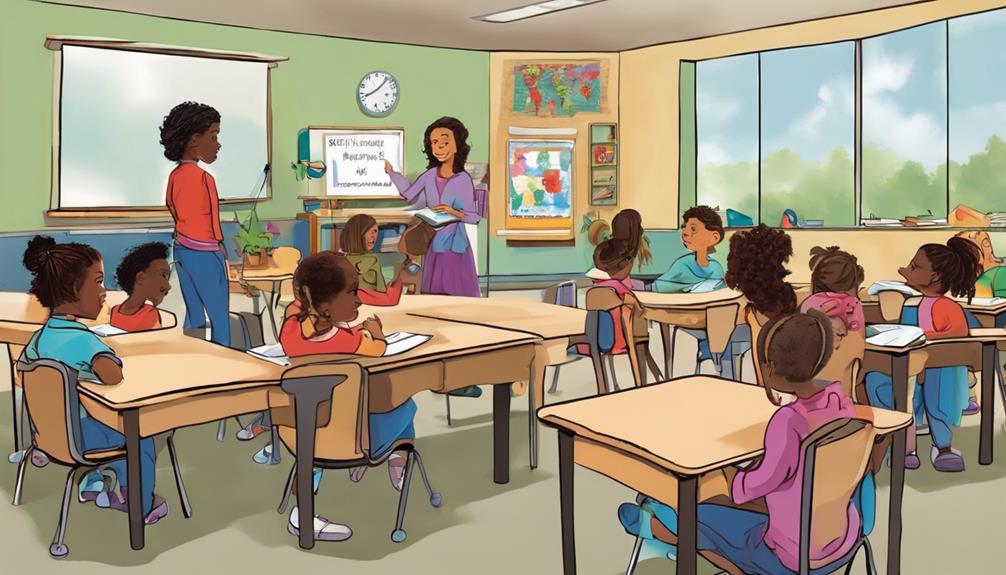According to research, about 40-50% of marriages in the United States end in divorce, affecting numerous children annually.
When facing this significant life event, it's essential to explore effective interventions that can support kids through the process. By implementing targeted strategies and tools, professionals and parents can help children navigate the complexities of divorce with resilience and adaptability.
In the following discussion, we will explore key interventions and techniques that can provide much-needed support and guidance for children coping with divorce.
Key Takeaways
- Counseling and therapy offer safe spaces for emotional expression and coping strategies.
- Positive co-parenting relationships and effective communication enhance children's emotional stability.
- Child-centered techniques like play therapy and art therapy aid in emotional expression and resilience building.
- Education programs and support groups empower children with essential skills and peer connections.
Therapeutic Support for Emotional Well-being
In our journey to support children coping with divorce, we prioritize therapeutic interventions for enhancing their emotional well-being. Children going through divorce often experience a whirlwind of emotions, from confusion to sadness, and therapeutic support plays a crucial role in helping them navigate these feelings. Counseling, play therapy, and art therapy offer safe spaces for children to express themselves and process the changes happening in their lives. Through these interventions, children can learn healthy coping mechanisms and gain a better understanding of their emotions.
Cognitive Behavioral Therapy (CBT) is a valuable tool in teaching children how to manage stress and develop effective strategies for dealing with the challenges divorce brings. Additionally, group therapy sessions create a supportive environment where children can connect with peers facing similar circumstances, fostering a sense of belonging and understanding. Therapists specializing in divorce-related issues guide children through their adjustment period, addressing concerns such as guilt, anxiety, and behavioral changes. By providing these interventions, we aim to help children build resilience, improve their emotional well-being, and equip them with the tools needed to navigate the complexities of divorce successfully.
Co-Parenting Strategies and Communication

Maximizing quality contact and minimizing conflict through effective communication strategies is paramount in supporting children's well-being in the context of divorce. Co-parenting strategies play a crucial role in creating a positive environment for children of divorced parents. By fostering positive co-parenting relationships and emphasizing parental cooperation, emotional stability and well-being can be maintained for the children.
It's essential for co-parents to engage in collaborative efforts, focusing on the needs of the children above all else. Effective communication, approached with respect and a businesslike demeanor, can help in decision-making and conflict resolution. Keeping children out of any disagreements and ensuring they're shielded from parental conflicts is key to their adjustment and overall emotional health during and after divorce.
Research underscores that children benefit most from a peaceful co-parenting dynamic, where their needs are met through harmonious parental interactions. Prioritizing the well-being of the children in all co-parenting strategies is fundamental for their healthy development post-divorce.
Child-Centered Counseling Techniques
Utilizing child-centered counseling techniques allows us to prioritize children's emotional well-being by empowering them to express their thoughts and feelings in a supportive environment. Through child-centered counseling, we focus on the child's emotions, thoughts, and experiences related to the divorce process.
Here are some key points to consider:
- Helping children develop coping strategies to navigate the challenges they face.
- Improving communication skills to express their needs and concerns effectively.
- Building resilience by fostering a sense of strength and adaptability.
- Engaging in play therapy to facilitate emotional expression and problem-solving in a safe space.
- Utilizing art therapy as a creative outlet for children to explore and communicate their feelings.
Education and Psychoeducation Programs

Empowering children with essential skills and knowledge to navigate the complexities of divorce, education and psychoeducation programs serve as invaluable resources in supporting their emotional well-being and resilience.
These programs, tailored to help children understand divorce, manage emotions, and enhance communication, play a crucial role in equipping them with coping skills. Research indicates that children who engage in education and psychoeducation programs demonstrate decreased anxiety, depression, and behavioral issues following their parents' divorce.
By focusing on bolstering resilience, self-esteem, and adaptive coping strategies, psychoeducation programs aid children in navigating the challenges of parental separation. Through these interventions, children develop the necessary tools to improve their overall well-being during the transition period.
Support Groups and Peer Interaction
In support groups, children find a safe and understanding environment to share their experiences and feelings with peers facing similar challenges during their parents' divorce. Peer interaction in these groups plays a crucial role in helping children feel less isolated and more understood, ultimately leading to improved emotional well-being.
Here are five key benefits of children participating in support groups:
- Learning coping strategies and problem-solving skills from peers
- Enhancing resilience by sharing experiences and insights
- Building social connections, friendships, and a sense of belonging
- Finding comfort in knowing they aren't alone in their struggles
- Decreasing feelings of loneliness, anxiety, and depression through shared experiences
Frequently Asked Questions
What Are Coping Methods for Helping Children Adjust to Divorce?
We encourage open communication, consistent routines, physical activities, play, and parental support to aid children in adjusting to divorce. Our focus is on providing stability, security, emotional expression, and understanding to help kids cope effectively.
What Is the Best Therapy for Children of Divorce?
We find that a combination of cognitive-behavioral therapy, play therapy, and family therapy offers the best support for children of divorce. These interventions help kids develop coping skills, process emotions, and strengthen family bonds.
What Activities Can Help Children Through Divorce?
We find activities like swimming, biking, and making puppets beneficial for kids coping with divorce. Engaging in creative outlets, like drawing and storytelling, assists children in expressing emotions and understanding changes in a positive manner.
How Can I Help My Grown Child Through Divorce?
We can support our grown child through divorce by acknowledging their feelings, encouraging open communication, offering practical assistance, respecting their autonomy, and staying connected with unconditional love. Together, we can help them navigate this challenging time.
Conclusion
In conclusion, it's essential to remember that children coping with divorce require our support and understanding.
Did you know that children of divorced parents are more likely to struggle academically and emotionally compared to children in intact families?
By implementing effective interventions like therapeutic support, co-parenting strategies, and child-centered counseling, we can help children navigate this challenging time with resilience and strength.
Let's work together to provide the necessary support and resources to help children thrive despite the challenges of divorce.










